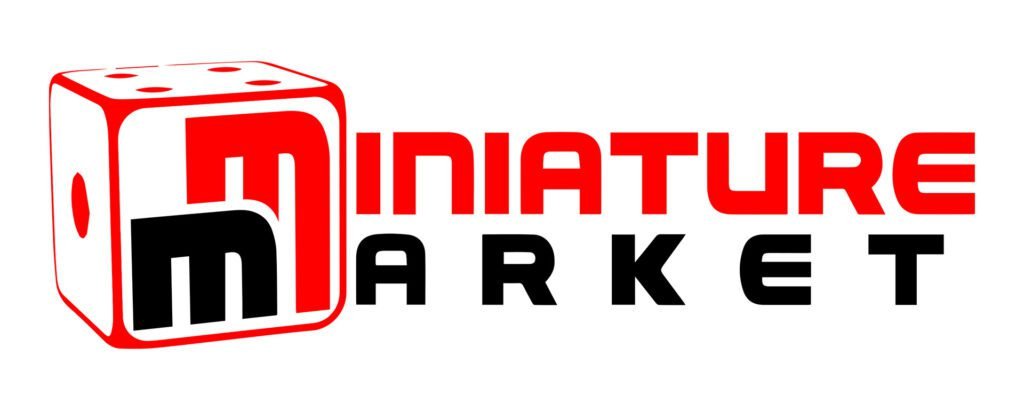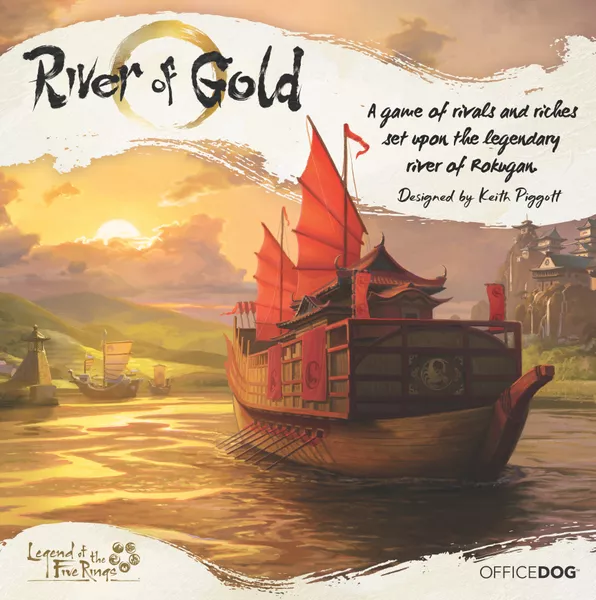
Today we’re diving into River of Gold. This is a competitive worker placement game, published by Office Dog Games, set in the mystical realm of Rokugan from the Legend of the Five Rings universe. It promises a strategic experience that blends resource management with indirect player interaction. So, let’s break it down – what it is, what’s good, what’s bad, & if you should pick it up. Let’s get into it.
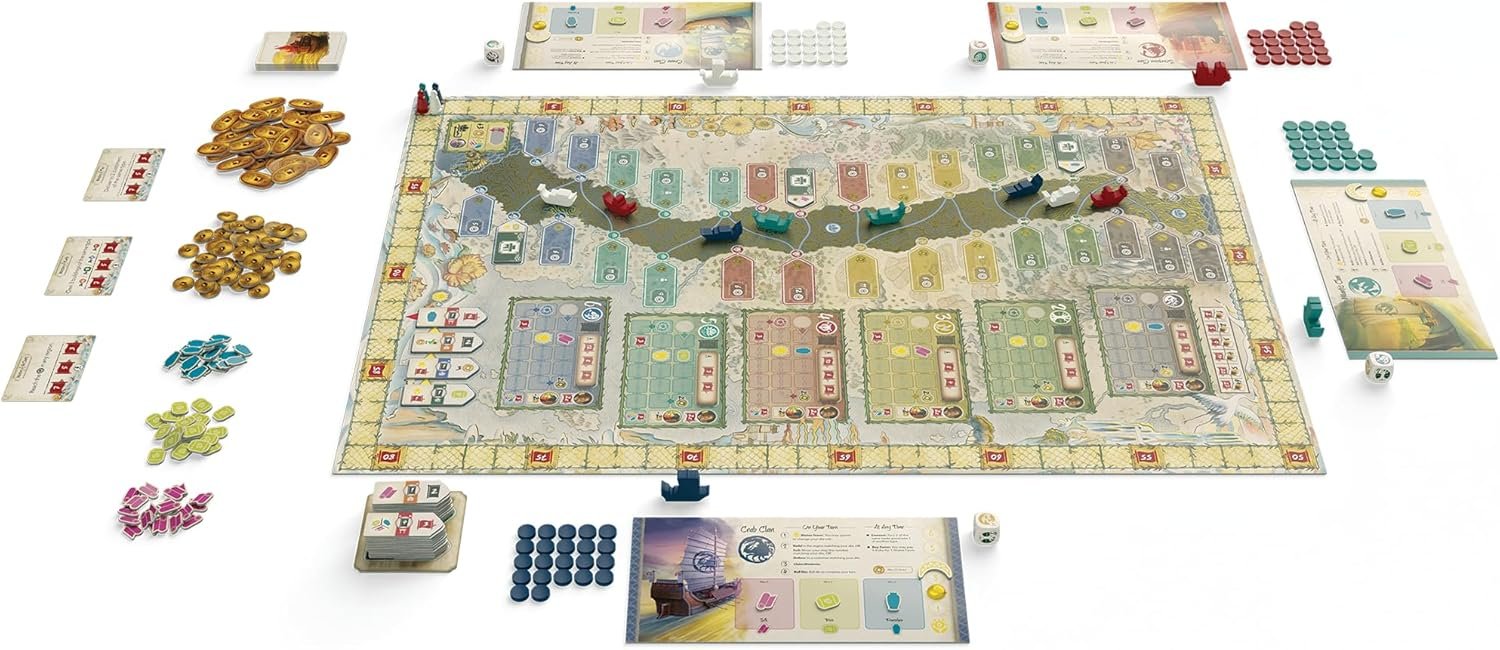
What It Is
River of Gold is a competitive Euro-style game designed for 2-4 players that focuses on trade development along the Kinokawa, or “River of Gold.” Players represent powerful clans from the Legend of the Five Rings universe—Crab, Crane, Mantis, or Scorpion—competing to gain regional influence, trade goods, & sway Artisans. A typical session lasts about 60-90 minutes, & the game is easy to learn, offering an accessible entry point for both newcomers & veteran Euro gamers.
Gameplay Overview
The game begins with the setup of the main board, which features the River of Gold divided by blue lines into various spaces, each linked to shore regions represented by six regional influence tracks. Players shuffle & distribute region scoring tiles, place Imperial Market & building tiles, & separate the building tiles by their respective eras. Each player chooses a clan, sets up their ships & markers, & prepares by drawing customer cards & receiving starting resources. Randomized turn order determines how much koku (the game’s currency) each player starts with.
Gameplay is divided into turns with four phases: Spin Divine Favor, Take an Action, Claim Masteries, & Roll the Die. In the Spin Divine Favor phase, players can spend favor points to adjust their dice rolls, influencing their actions. During the Take an Action phase, players choose from three main actions: build a building, sail a ship, or deliver goods to a customer. Claiming Masteries involves completing mastery cards, while rolling the die prepares the player for their next turn.
Building a structure requires choosing a shore space that matches a player’s die result & paying koku to place a building from the building row. Each building has various bonuses, including visitor & owner rewards. Players also gain influence in the region tied to the shore space, advancing on the influence track & earning rewards along the way. Sailing a ship allows players to move along the river, collecting visitor rewards from the connected shore spaces, such as trade goods, influence, or points.
Delivering goods to a customer requires matching a customer card with the die result. Each customer provides benefits depending on their type—Artisans, Monks, Merchants, Nobles, or Elders—and triggers immediate or ongoing effects. These effects may include boosting favor, offering movement bonuses, or granting points at the game’s end. For example, Monks increase a player’s Divine favor capacity, while Nobles allow for enhanced ship abilities & scoring.
As the game progresses, players will interact with the free actions system, allowing them to exchange goods or koku for resources like Divine favor. The game is paced by the depletion of building tiles. Once era one tiles are exhausted, the Emperor Visit phase occurs, granting players rewards from all their buildings. The second era then begins, introducing new, more powerful buildings. The game ends after all era two tiles are used, with players taking one final turn before final scoring.
In the final scoring phase, players gain points based on their regional influence, customer deliveries, & specific bonuses from Merchants, Nobles, & Artisans. The player with the most points at the end of this phase emerges victorious in River of Gold.
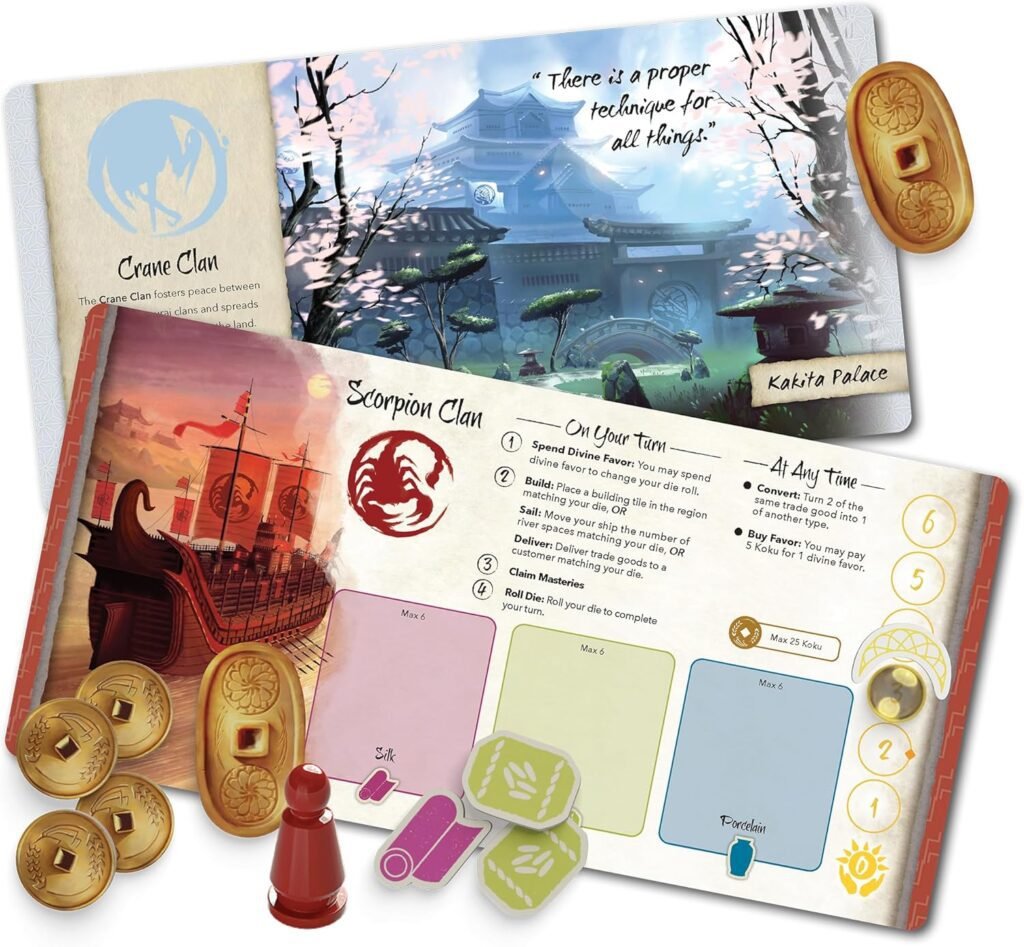
The Components
First impressions matter, & River of Gold nails it with its beautiful board & components. The artwork, enhanced by gold foil accents, brings the river & surrounding regions to life, making for an aesthetically pleasing experience. The dice are chunky & satisfying to roll, & the building tiles are of solid quality. However, the game insert has been called “totally useless,” which might frustrate those who appreciate good component storage.
The Good
One of the standout elements of River of Gold is its accessibility. The rulebook is concise, well-written, & easy to digest, making it a great choice for players new to worker placement or Euro games. Despite the simplicity, there’s enough depth for more experienced gamers to sink their teeth into, especially with the interaction between the favor tracks, building placement, & resource delivery.
Another plus is the game’s pacing. Turns are quick, keeping downtime to a minimum, & the strategic decisions feel meaningful. The end-game tension, where the game accelerates as more building tiles are purchased, adds a layer of excitement as players race to complete their plans before the game ends.
Replayability is also strong, thanks to the random building tiles & modular board, which keep each session feeling fresh. The Legend of the Five Rings setting adds thematic flair for fans of the universe, although it’s not required to enjoy the game.
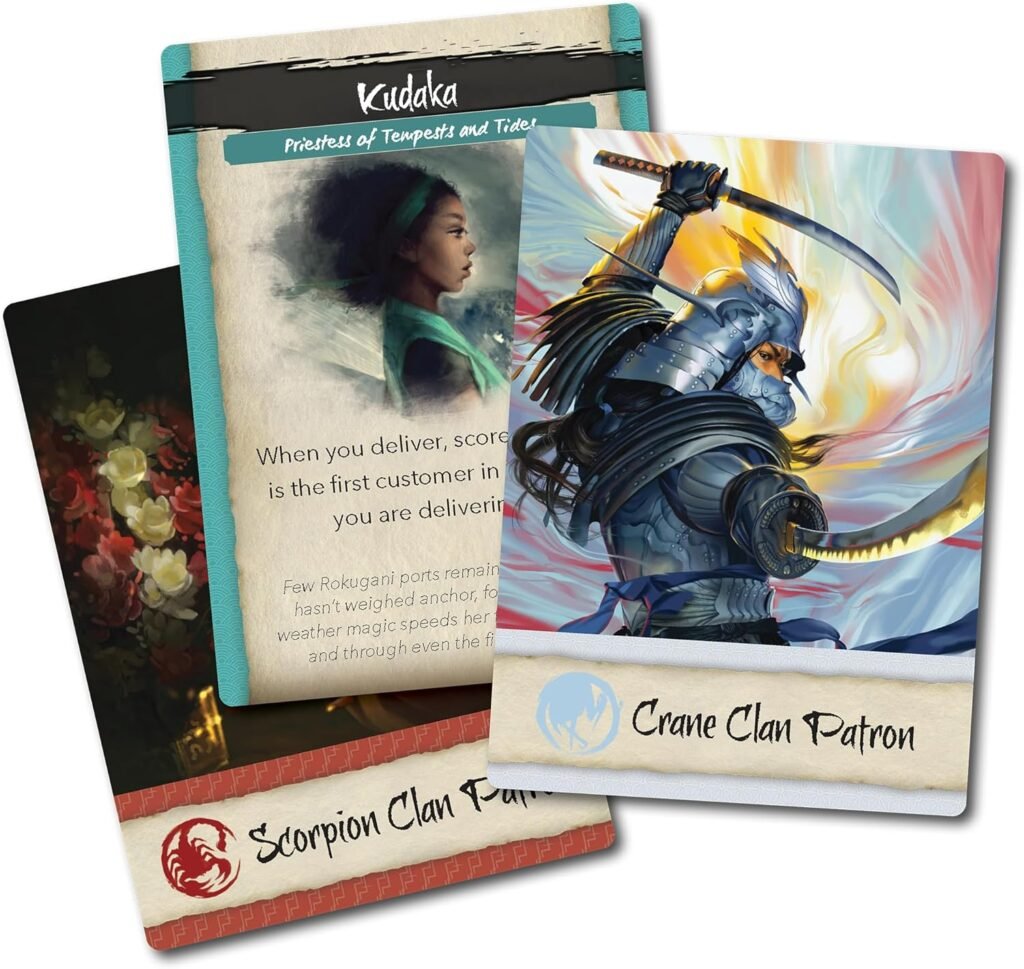
The Bad
While River of Gold is solid, it doesn’t break any new ground in terms of mechanics. For seasoned Euro gamers, the familiar worker placement & resource management mechanics might feel a bit too safe, especially for those looking for something innovative.
Another minor issue is with the adjacency of shore spaces to boats, which can occasionally be unclear. However, this becomes less of a problem as you get more familiar with the game.
The Verdict
So, should you buy River of Gold? If you’re into Euro games or love the Legend of the Five Rings universe, it’s an easy recommendation. The gameplay is smooth, strategic, & offers plenty of replay value. It’s not a groundbreaking game, but it doesn’t need to be – it delivers a solid, enjoyable experience that’s easy to learn but rewarding to master.
For more experienced gamers, it may lack the novelty you’re seeking, but the combination of beautiful components & well-balanced mechanics still makes it a worthwhile addition to your collection. It’s a great gateway game, ideal for introducing new players to Euro-style strategy while offering enough complexity to keep veterans entertained.
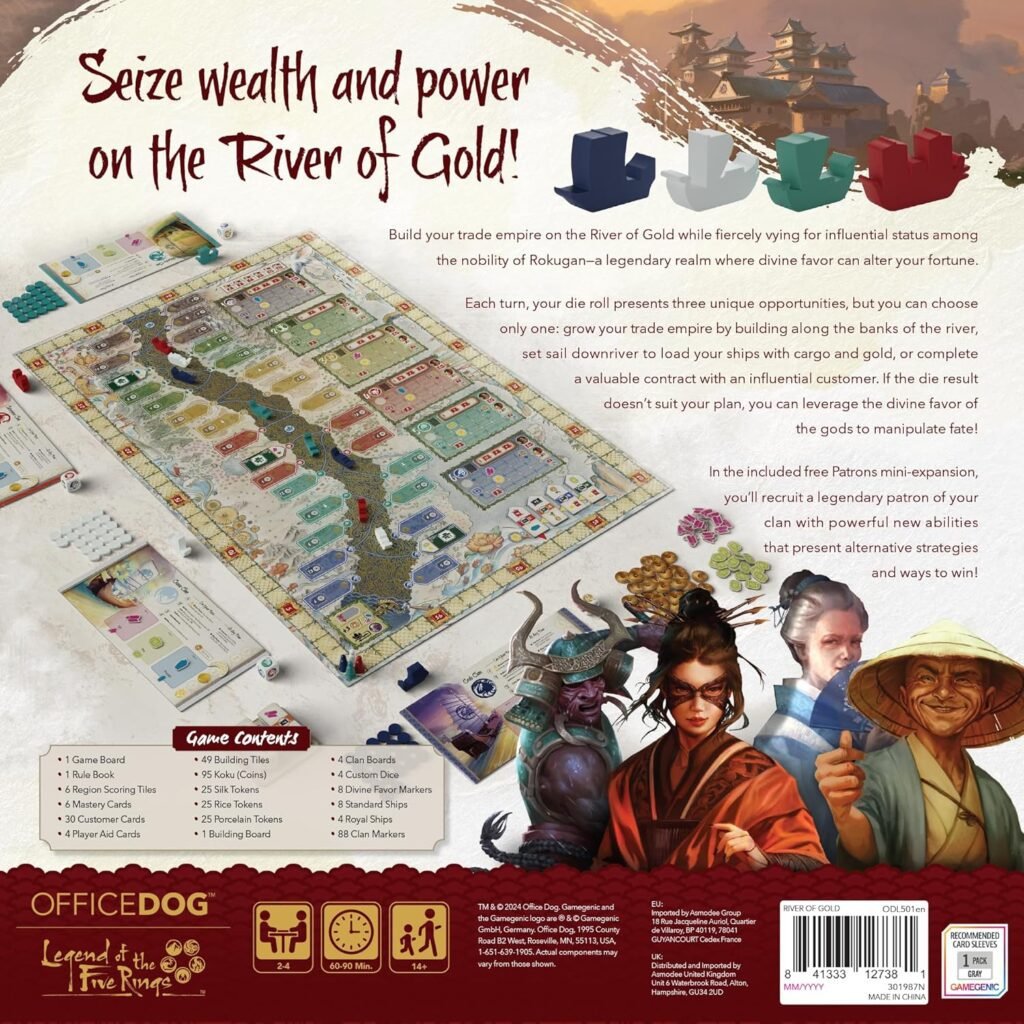
Final Thoughts
River of Gold is one of those games that sneaks up on you with how enjoyable it is. At first glance, it looks like a fairly standard Euro-style game, but once you start playing, its simplicity & smooth gameplay really shine. The core structure—rolling a die, adjusting the result with Divine Favor, & then deciding whether to move your boat, buy a building, or deliver resources—makes for quick turns & keeps the pace moving. The strategy comes not from the complexity of the rules, but from the decisions you make within them.
The biggest strength of the game, in my opinion, is how it encourages players to focus on specific paths to victory. You’re never overwhelmed with too many options, but the ones you do have can lead to very different outcomes. Whether you decide to specialize in delivering resources, building up influence in regions, or focusing on mastery cards, the game rewards you for sticking to a plan. But it’s not always easy to know when to shift gears & try something new, & that’s where a lot of the strategic tension comes in.
The end-game mechanic, where moving your boat can speed up the game’s conclusion, is a clever touch. It puts pressure on players to think ahead & make sure they’re not left scrambling as the game winds down. There’s a fun element of second-guessing here, where you’re trying to figure out if your opponent is really racing to finish the game or if they’re just bluffing to throw you off. That tension adds a lot of excitement to what could otherwise be a more straightforward experience.
Replayability is solid, too. With the random setup of buildings & mastery cards, each game feels a little different. Some rounds will focus more on collecting resources, while others might require more careful money management. The variability keeps things interesting, & it’s one of the reasons I found myself wanting to dive right back in after a game ends.
However, I will say that River of Gold doesn’t reinvent the wheel. If you’ve played a lot of Euro games, especially ones that involve worker placement or resource management, this won’t feel like something completely new. That’s not necessarily a bad thing—it’s just something to keep in mind if you’re looking for a game that offers something radically different.
In the end, I think River of Gold is a fantastic choice for anyone who enjoys strategy games that don’t overcomplicate things. It’s easy to learn, quick to play, & offers just the right amount of depth to keep you coming back. Whether you’re introducing newer players to the genre or just want a fun, medium-weight game that won’t drag on for hours, this one is definitely worth checking out.
Purchase Options

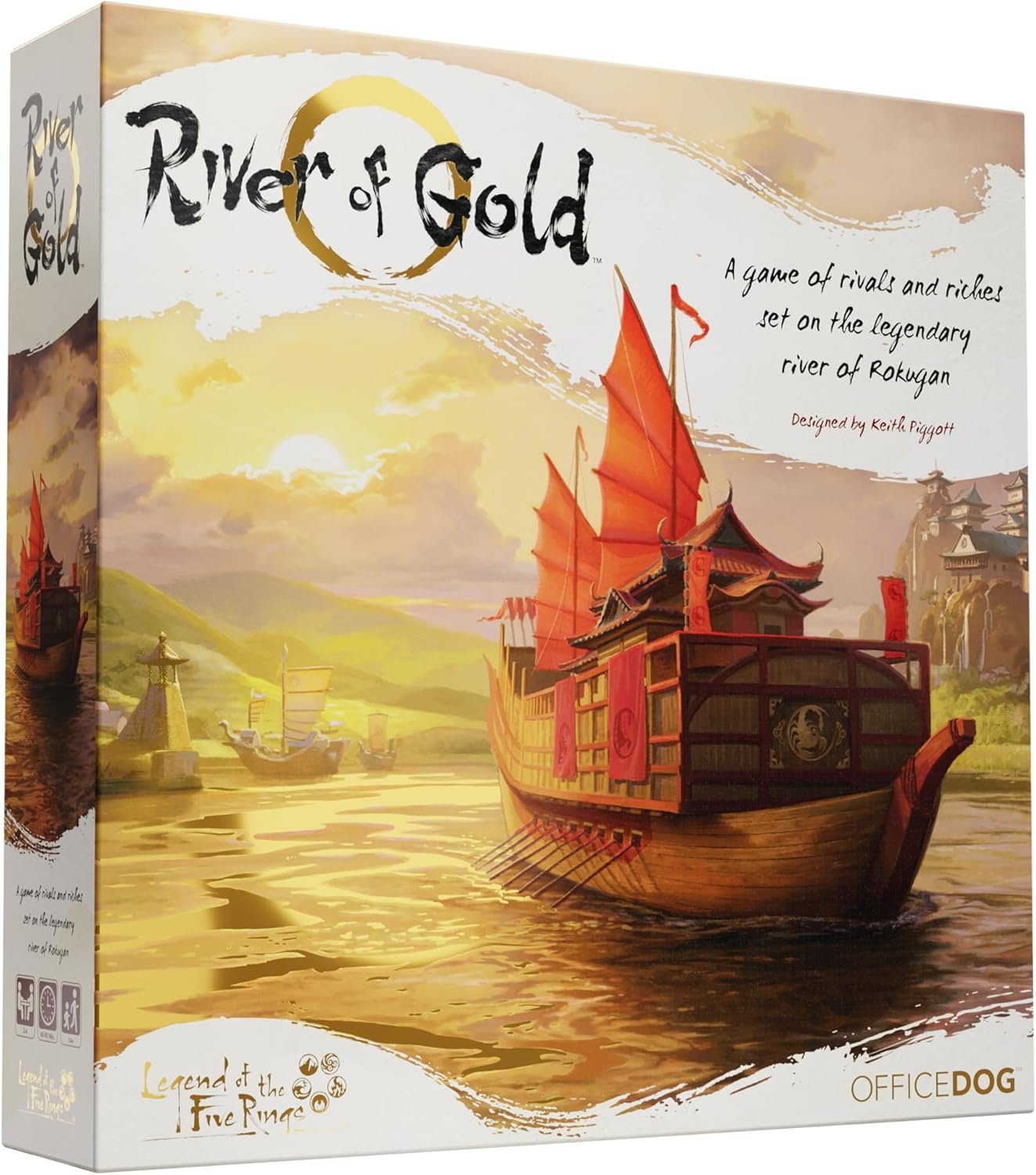
At no extra cost to you, The Board Game Site may receive revenue from affiliate and advertising partnerships for sharing this content and from purchases through links.



